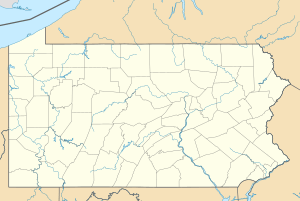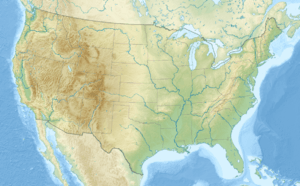Indian Camp Run (Brokenstraw Creek tributary) facts for kids
Quick facts for kids Indian Camp Run |
|
|---|---|
|
Location of Indian Camp Run mouth
|
|
| Other name(s) | Tributary to Brokenstraw Creek |
| Country | United States |
| State | Pennsylvania |
| County | Warren |
| Physical characteristics | |
| Main source | divide between divide between Indian Camp Run, Lansing Run, and Irvine Run about 3 miles southeast of Matthews Run, Pennsylvania 1,730 ft (530 m) 41°53′38″N 079°18′51″W / 41.89389°N 79.31417°W |
| River mouth | Brokenstraw Creek Youngsville, Pennsylvania 1,184 ft (361 m) 41°51′22″N 079°18′55″W / 41.85611°N 79.31528°W |
| Length | 2.70 mi (4.35 km) |
| Basin features | |
| Progression | south |
| River system | Allegheny River |
| Basin size | 2.44 square miles (6.3 km2) |
| Tributaries |
|
| Bridges | Indian Camp Run Road, Mill Street |
Indian Camp Run is a small stream, about 2.70 mi (4.35 km) long, located in Pennsylvania, United States. It's a "tributary," which means it's a smaller stream that flows into a larger one. In this case, Indian Camp Run flows into Brokenstraw Creek. The Pennsylvania Fish and Boat Commission considers it a "cold water fishery," meaning its waters are cold enough for certain types of fish, like trout, to live there.
Where Indian Camp Run Flows
Indian Camp Run begins in Warren County, Pennsylvania. Its source is about 3 miles (4.8 km) southeast of a place called Matthews Run. From there, the stream flows generally south. It continues its journey until it joins Brokenstraw Creek in the town of Youngsville.
Understanding the Watershed
A "watershed" is an area of land where all the water drains into a single stream, river, or lake. The Indian Camp Run watershed covers about 2.44 square miles (6.3 km2) (6.32 km²) of land. This area is part of a region known as the Pennsylvania High Plateau.
The land in this watershed gets a good amount of rain and snow each year, averaging about 44.5 inches (113 cm) of precipitation. A large part of the watershed, about 78%, is covered by forests. This means there are many trees and plants that help keep the water clean and healthy for the animals living there.
 | Delilah Pierce |
 | Gordon Parks |
 | Augusta Savage |
 | Charles Ethan Porter |



